

Von der Leyen: EU now in ‘positive competition’ with US over climate action. Carbonbrief When might the world exceed 1.5C and 2C of global warming. Net zero Europe. Interview: Former EU climate chief Connie Hedegaard on the bloc’s low-carbon future. Can Joe Biden make good on his revolutionary climate agenda? When Joe Biden won the US presidency earlier this month, it seemed like a huge opportunity to restore the country’s position as a leader in the fight against climate change.
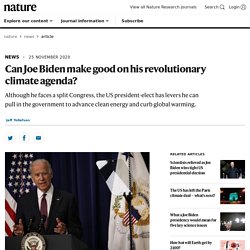
But whether he’ll be able to deliver on his climate agenda — the most aggressive ever put forth by a leading US presidential candidate — remains to be seen, especially because he will face a powerful Republican opposition in Congress. Still, climate-policy experts say that there is a lot the former senator and vice-president to Barack Obama can do, including exerting his authority over federal agencies to drive forward his agenda, and leveraging his experience working with both parties in the Senate to push legislation in Congress. “This is really the first time that a US president is leading with climate,” says Vicki Arroyo, executive director of Georgetown University’s Climate Center in Washington DC. Biden’s election comes at a crucial juncture. Relying on Congress “This is a major opportunity,” says Inglis. Can Joe Biden Regain the World's Trust on Climate Change? Blog: After the US election, are the stars aligning for climate action?
Biden names John Kerry climate czar, in a recommitment to global cooperation. Climate Crisis: What we know and what we can do about it. Race-to-Zero November Dialogues Programme. On 9-19 November the High-Level Champions for Global Climate Action are convening the Race to Zero Dialogues, in close collaboration with the Marrakech Partnership.
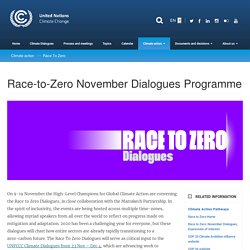
In the spirit of inclusivity, the events are being hosted across multiple time-zones, allowing myriad speakers from all over the world to reflect on progress made on mitigation and adaptation. 2020 has been a challenging year for everyone, but these dialogues will chart how entire sectors are already rapidly transitioning to a zero-carbon future. 9 Things the Biden Administration Could Do Quickly on the Environment. WASHINGTON — President-elect Joseph R.
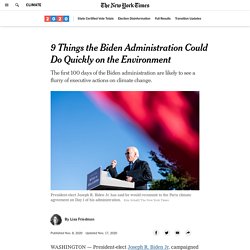
Biden Jr. campaigned on the most ambitious climate platform of any presidential candidate in history, promising to spend $2 trillion over four years to draw down planet-warming fossil fuel emissions and convert much of the nation to clean energy. The possibility that the Senate could remain under the control of Republicans, who have generally opposed climate legislation, puts a damper on some of his biggest-ticket plans. But with or without Democratic control of the Senate, the first 100 days of the Biden administration are likely to see a flurry of executive actions addressing climate change, as well as a major push to insert clean energy provisions into legislation that could pass with a bipartisan coalition. New initiative on transformational economics, Earth4All, launched - Club of Rome.
A major new international collaboration Earth4All was launched today at the UNFCCC Race to Zero Dialogues session on Transformational Leadership.
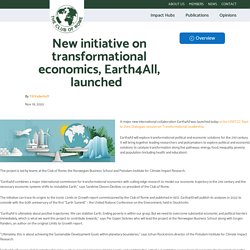
Earth4All will explore transformational political and economic solutions for the 21st century. It will bring together leading researchers and policymakers to explore political and economic solutions to catalyze transformation along five pathways: energy, food, inequality, poverty and population (including health and education). The project is led by teams at the Club of Rome, the Norwegian Business School and Potsdam Institute for Climate Impact Research.
“Earth4All combines a major international commission for transformational economics with cutting edge research to model our economic trajectory in the 21st century and the necessary economic systems shifts to restabilise Earth,” says Sandrine Dixson-Declève, co-president of the Club of Rome. “Earth4All is ultimately about positive trajectories. Top court gives France three months to fulfil climate change commitments. Issued on: 19/11/2020 - 12:29 In a ruling hailed by campaigners as "historic", France's top administrative court on Thursday gave the government a three-month deadline to show it is taking action to meet its commitments on climate change.

The government of France, which brokered the landmark 2015 Paris Agreement on climate change, was hauled before the Council of State by Grande-Synthe, a low-lying northern coastal town which is particularly exposed to the effects of climate change. The Council, which rules on disputes over public policies, noted that "while France has committed itself to reducing its emissions by 40% in 2030 compared to 1990 levels, it has, in recent years, regularly exceeded the 'carbon budgets' it had set itself.
" It also noted that President Emmanuel Macron's government had, in a decree in April, deferred much of the reduction efforts beyond 2020. Corinne Lepage, lawyer for the town of Grande Synthe, hailed the decision as "historic". Climate change: Covid pandemic has little impact on rise in CO2. Paris is passé as climate green deals become chic. Press play to listen to this article.
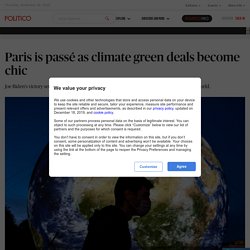
The tech we need. In the fourth chapter of The Wonk’s Survival Guide to the European Green Deal, POLITICO looks at the technological breakthroughs the European Union will need to become climate neutral.

Brussels’ green moonshots Six future-thinking technologies that could help the EU cut back on emissions. By AITOR HERNÁNDEZ-MORALES and MELISSA HEIKKILÄ. World pushes ahead with climate action as US remains in limbo. Press play to listen to this article The United States government will be missing from a global climate summit for the first time next month, and the timing couldn’t be more inconvenient for other world leaders.
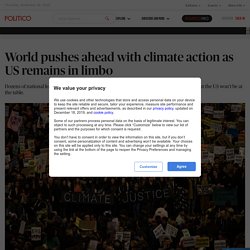
They are desperate to commence work with the incoming Biden administration, which is promising the most ambitious climate change policies of any incoming American administration, including a "100 percent clean energy economy” and “net-zero emissions no later than 2050. " But when dozens of national leaders gather online on December 12, at a summit organized by the U.K. government to press ahead with a new and more onerous stage of the Paris climate agreement, the U.S. won’t be at the table: The Trump administration has left the agreement, while President-elect Joe Biden and his transition team can’t attend. “We've seen several U.S. states make commitments to net zero over the last six months,” Murton said. Tell the EU to withdraw the new Common Agricultural Policy. Russian climate decree raises false hopes. Amid the maelstrom of the US election results and confirmation that the country had indeed left the Paris Agreement, Russia quietly published a decree setting out its emissions reduction plans.
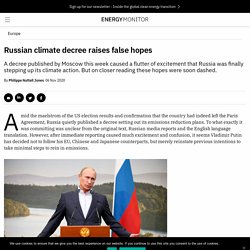
To what exactly it was committing was unclear from the original text, Russian media reports and the English language translation. However, after immediate reporting caused much excitement and confusion, it seems Vladimir Putin has decided not to follow his EU, Chinese and Japanese counterparts, but merely reinstate previous intentions to take minimal steps to rein in emissions. Initial reactions to the low-key, one-page decree from Putin’s office suggested Russia had committed to cut emissions by 70% by 2030 compared with 1990 levels. On closer inspection, however, he was simply repeating previous pledges to ensure the country’s emissions by 2030 are no more than 70% of 1990 levels. ‘Crisis next door’: EU’s eastern neighbours at risk of water crisis. Les Etats-Unis ont quitté l’accord de Paris... mais c’est l’élection qui sera décisive pour le climat.
C’est un étrange hasard du calendrier.

An Expert's opinion : Interview with Luca De Biase about Climate change - European Science-Media Hub. “Great science journalism requires a methodology” Interview with Luca De Biase, journalist & Innovation editor at Il Sole 24 Ore and editor in chief at Nova24. Lecturer on Media Ecology at University Sant’Anna, Pisa, and Stanford University. States’ Human Rights Obligations in the Context of Climate Change: 2020 Update (March 2020) As governments and intergovernmental organizations have recognized, climate change has adverse impacts on a wide range of human rights. Consequently, States must uphold their existing human rights obligations defined under legally binding treaties in the context of climate change and climate policies. Many of Europe's protected areas lack specific conservation measures and objectives. The EEA briefing ‘Management effectiveness in the EU’s Natura 2000 network of protected areas’ sums up the results of a larger, joint study by the EEA, The Institute for European Environment Policy (IEEP), UNEP-WCMC and Trinomics.
The joint study aims to improve the evaluation of the management of protected areas. According to the EEA briefing, EU Member States have so far reported on the management effectiveness of less than 8 % of protected Natura 2000 sites. This is despite the EU’s and its Member States’ international commitment to assess the management of 60 % of its protected areas by 2015. To demonstrate progress towards this goal, monitoring and reporting must improve considerably either through an EU-coordinated process or through compilation of national reporting, the briefing states. The EEA briefing looks at five EU Member States in more detail, showing large differences in the evaluation of protected sites’ management.
Towards Europe 2030: resilient nature, sustainable economy and healthy lives. The COVID-19 pandemic has been a gamechanger. The world has seen wars, economic and financial crises, wildfires, food shortages and migration waves, and local and seasonal epidemics. But this pandemic is unlike anything current generations have experienced before. It spread around the globe, affected directly or indirectly millions, if not billions of people, locked societies down, closed borders and brought entire sectors to a halt — and did all this over just a matter of months. It has now been six months since many countries in Europe implemented lockdown measures to combat COVID-19. Debate corner: COVID-19 and the environment. The European Environment Agency (EEA) and Network of the Heads of European Environmental Protection Agencies (EPA Network) are planning a series of virtual high-level debates, focusing on the impacts of COVID-19 and the challenges the pandemic poses to meeting long-term climate and environment goals.
Each debate will be streamed live on the EEA's Facebook page. A selection of questions by our social media followers will be put forth to our panel. The debates will be recorded and made available afterwards through this platform as well as our social media channels. Countries and cities in Europe urgently need to step up adaptation to climate change impacts.
Moving towards zero pollution in Europe. The report ‘EEA Signals 2020 – Towards zero pollution in Europe’ presents an overview of air, water and soil pollution as well as other angles to the topic, based on previously published EEA information and data. Latest evaluation shows Europe's nature in serious, continuing decline. Interview: ETS guru Jos Delbeke on the EU’s biggest climate challenges. EU biodiversity laws need tougher monitoring and clearer measures of progress. European Council: Leaders push back decision on 2030 climate goal. Carmakers seek help with ‘massive additional investments’ in green transition. IN DEPTH: New 10-year environment plan set to fix Europe’s green deal in law. B90GRUENE Europawahlprogramm 2019 barrierefrei. LEAK: EU’s draft methane strategy puts onus on data, reporting. A draft version of the European Commission’s methane strategy, due to come out on Wednesday (14 October), doesn’t set limits on methane emissions from fossil fuels, instead setting the stage for that to happen as of 2025.
Lack of data and agreed measurement methodologies are currently hampering policy initiatives to contain methane emissions in sectors such as agriculture and energy, the European Commission says in its draft strategy, seen by EURACTIV. Methane is a powerful greenhouse gas which is nearly 90 times more potent than CO2 during its first 20 years in the atmosphere and addressing emissions is “an important and urgent issue” as part of EU efforts to tackle global warming, the Commission says.
‘Historic moment’: European Parliament set to back 60% emissions cut target. Climate scientist: EU needs separate targets for CO2 cuts and carbon sinks. Blog: How a minor rebellion pushed a higher EU climate target over the line. Climate Law: Parliament sets up showdown with member states. It takes two to tango: how to jointly analyse social and environmental policies? Climate Action. EU Biodiversity strategy for 2030. Why do we need to protect biodiversity?
52019DC0640. Brussels, 11.12.2019 COM(2019) 640 final. Are wildfires the end of the Californian dream? Endangered baby sea turtles may have a new savior: GPS eggs. Conservation scientist Kim Williams-Guillén was wracking her brain to come up with a way to save endangered sea turtles from egg poachers when she had an “aha” moment: If she placed a fake egg containing a GPS tracker in the reptiles’ nests, she might be able to track the thieves. The idea won her the 2015 Wildlife Crime Tech Challenge—and a $10,000 prize. Now, Williams-Guillén, a conservation scientist at the environmental nonprofit Paso Pacífico, and a multinational team of colleagues have not only made the device—dubbed the InvestEGGator—but have also published the results of their first field test. Plastic waste: EU at risk of a surge in illegal disposal, auditors warn. Climate scientist: EU needs separate targets for CO2 cuts and carbon sinks. 2020 09 Cities Mission mission proposal FINAL.
‘Trojan horse’: Campaigners criticise GDP focus of European Green Deal. Timmermans defends change to EU climate target baseline. ‘State of the union’: Von der Leyen commits to 55% emissions cut. Norway to plough €1.5bn into ‘greatest climate project’ ever seen. We must put our greenbacks behind our green rhetoric. A socially and environmentally just way to fight climate change. Interactive World Forest Map & Tree Cover Change Data. Animal populations worldwide have declined nearly 70% in just 50 years, new report says. It's impossible to deny — humans are destroying the natural environment at an unprecedented and alarming rate. According to a new report out Tuesday, animal populations have declined by such a staggering amount, that only an overhaul of the world's economic systems could possibly reverse the damage.
Nearly 21,000 monitored populations of mammals, fish, birds, reptiles and amphibians, encompassing almost 4,400 species around the world, have declined an average of 68% between 1970 and 2016, according to the World Wildlife Fund's Living Planet Report 2020. Species in Latin America and the Caribbean, as well as global freshwater habitats, were disproportionately impacted, declining, on average, 94% and 84%, respectively.
Every two years, the World Wildlife Fund (WWF) releases its landmark report, revealing how far species populations have declined since 1970 — an important marker for the overall health of ecosystems. Humans are to blame The food industry needs an overhaul. Goal 15: Life on Land. Goal 14: Life Below Water. Goal 13: Climate Action. Climate change and trade union issues. 2020 AC6 en. Climate finance: an agenda for EU coordination with emerging markets. Addressing the challenge of financing the low-carbon transition will require substantial investment in the European Union and in emerging and developing economies. Sustainable finance frameworks have proliferated in advanced and emerging markets but fragmentation of financial flows due to different classification systems and standards for green financial instruments is a real risk.
Tackling pollution and climate change in Europe will improve health and well-being, especially for the most vulnerable. Debate corner: COVID-19 and the environment. Présidentielle américaine, J − 49 : Joe Biden attaque Donald Trump sur le climat. Pendant que la Californie brûle, Trump minimise le changement climatique.
TechCrunch fait désormais partie de Verizon Media. Coronavirus Shows Us What Climate Change Disruption Could Look Like – BRINK – News and Insights on Global Risk. There’s No Containment Strategy for Climate Change. Should Plants and Animals That Relocate Because of Climate Change Be Considered Invasive? Time to revise the Sustainable Development Goals. Nature and biodiversity - Environment. Shaping the post-Corona planet: knowledge on Europe's environment and climate. Together we can move forwards: building a sustainable planet after the corona shock.
ESG investors wake up to biodiversity risk. 5 Global Trends Shaping Our Climate Future. Coronavirus: The Path to the Next Normal. How business leaders should confront climate risk. Deadly Heatwaves. How animals are coping with the global 'weirding' of the Earth's seasons. Global GDP Could Fall 20% as Climate Change Heats up.